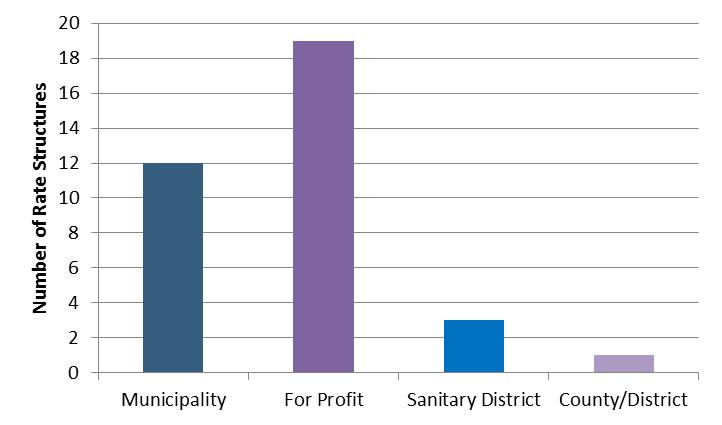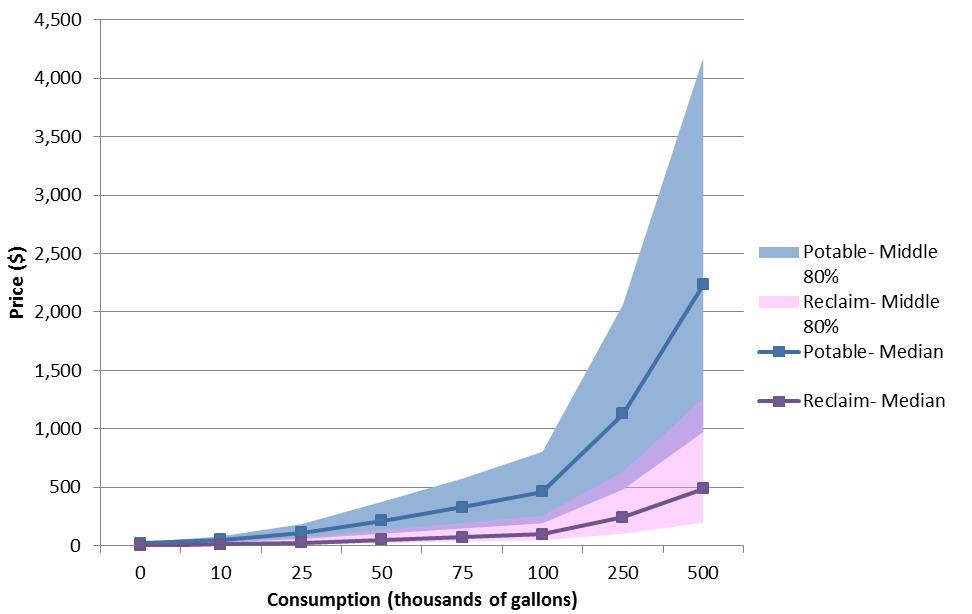By Cole Wilhelmi and David Tucker
Ongoing severe drought conditions in the American Southwest offer the powerful reminder that our water resources should not be taken for granted. With increasing environmental pressure comes greater demand for policies and technologies that prioritize conservation and efficiency in water systems. The EFC examined these and other questions about water pricing, conservation, affordability, cost recovery, and regulation in a recent project to study water and wastewater rates and finances in the state of Arizona, in partnership with the Water Infrastructure Finance Authority of Arizona.
One promising method to help communities achieve water supply sustainability goals is through the use of reclaimed water. Reclaimed water is treated wastewater that is reused in a variety of agricultural, commercial, and landscaping applications, instead of being discharged into dry washes, rivers, or lakes. The EFC’s aforementioned study on water and wastewater rates included our first survey of reclaimed water rates in Arizona, which is one of the few states in the union making extensive use of reclaimed water. In central Arizona, 95% of the wastewater generated is reclaimed to serve beneficial uses. And 82% of current water reuse in the U.S. overall occurs in Arizona, Texas, California, and Florida. Let’s now take a closer look at the regulations, advantages, and pricing for Arizona’s reclaimed water.
Reclaimed Water Rate Structures in 2015 WIFA-EFC Arizona Rates Survey, by Utility Type (n=35)

How Reclaimed Water is Defined and Classified in Arizona
Some consumers perceive reclaimed water based on the media-popularized phrase “toilet-to-tap,” implying (incorrectly) that wastewater is directly recirculated into drinking water supplies. In some quarters, this has led to reluctance to embrace reclaimed water programs, based on fears that recycled water could be unhealthy. In reality, the state of Arizona has clearly defined minimum reclaimed water quality requirements for various types of direct reuse, to ensure consumers and the public are protected. While Arizona does not allow reclaimed water to be directly reused as potable water (regardless of how highly it is treated), indirect reuse, where highly treated reclaimed water is released to a body of water or stored underground to later be pumped, treated to potable standards and delivered, is widely practiced in Arizona and throughout the U.S. Moreover, the 1980 Arizona Groundwater Management Act mandates that jurisdictions designated as Active Management Areas (AMA’s – typically the most populated areas in Arizona) must establish “safe-yield” goals to replace as much groundwater as they withdraw. Hence the use of reclaimed water can be quite a “big deal” for water utilities in the AMA’s, representing a most valuable resource.
Wastewater treatment plants and direct reuse customers are issued permits by the Arizona Department of Environmental Quality (ADEQ) to distribute or use reclaimed water for specific applications other than potable water use, such landscape irrigation, crop agriculture, recharging aquifers, generating electric power, etc. ADEQ states more than 70% of the reuse permits issued were for A or A+ class water (the highest quality classes), allowing more reuse options and flexibility. All classes of reclaimed water are defined by the minimum treatment levels they receive and the levels of pollutants present. Classes B and C are of lower quality than A or A+, so their permitted direct reuse is limited to applications where human exposure is less likely, such as livestock watering or cleaning streets.
Reclaimed Water Finance: Benefitting End-Users, Utilities, and Communities
Using reclaimed water brings tangible benefits to multiple groups. First, communities may benefit because reclaimed water is used, for purposes such as those listed above, instead of using potable water, conserving precious drinking water reserves. Second, end users benefit because reclaimed water is significantly cheaper than potable water. Of the 35 wastewater utilities offering unique reclaimed water rates in the EFC’s study, the median volumetric rate for reclaimed water was just 77 cents per thousand gallons, much lower than typical potable water volumetric rates.
Some private wastewater companies offer still lower prices, sometimes even offering treated effluent for free from company standpipes on an “as-available basis.” Others sell reclaimed water at “market rates” – typically whatever price the customer is willing to pay. Many wastewater utilities have contracts with local high-volume users such as golf courses, allowing purchasers a local, cheap, easily accessible water supply for landscape irrigation. Financially, why would wastewater utilities do this? First, because utilities can avoid costly surface discharge / groundwater aquifer replenishment (and its associated permitting and monitoring costs) by selling treated effluent to nearby customers. Second, because of the strategic importance in Arizona of reclaimed water for maintaining scarce water supplies: where the infrastructure required to distribute the reclaimed water is more cost effective than aquifer recharge and more beneficial to water portfolios than surface discharge, utilities seek out nearby direct reuse customers. One fascinating example: the Palo Verde Nuclear Generating Station, which contracts with several Phoenix area cities for up to 80,000 acre-feet of reclaimed water annually for cooling purposes.
2015 Arizona Commercial Water Bills for Potable versus Reclaimed Water, by Monthly Consumption

Reclaimed Water Finance: Conclusions
Incorporation of reclaimed water into water system capital planning, finance, and rate-setting is a win-win-win for all: communities conserve precious potable water resources, end-users save money by purchasing cheaper reclaimed water, and wastewater utilities have a cost-saving means of safely and conveniently disposing of treated wastewater – which, moreover, generates reliable revenue for the utility and serves as another key water source for a variety of beneficial uses. As effects of global climate change worsen, government policymakers in the southwestern United States may be hard-pressed to find effective and affordable solutions to drought and water scarcity. Comprehensive reclaimed water programs such as those in Arizona may provide at least part of the answer.
Special thanks to our project partners: the Water Infrastructure Finance Authority of Arizona, the Arizona Municipal Water Users Association, League of Arizona Cities and Towns, Northern Arizona Municipal Water Users Association, and Water Resources Research Center at the University of Arizona.
Cole Wilhelmi is a student Research Assistant, and David Tucker is a Project Director at the Environmental Finance Center at UNC Chapel Hill.


4 Responses to “A Win-Win-Win: Regulation, Use, and Pricing of Reclaimed Water in Arizona”
Len Laskowski
All landscaping for new residential properties should be required to use only native plantings not requiring irrigation.
Also, pricing for water consumption should be on a highly tiered basis to encourage conservation.
Bob Rick
Being from the midwest water conservation had not been a real concern of mine until i was able to make the connection with water system reserve capacity and water accountability. If the reserve capacity gets to the point where capital improvements are necessary can I secure the needed funding? If so at what cost? Just a few reason why conservation measures could be a “better bang for my buck”.
Great article.
Greg Chick
Water is dirt cheap, but still there are those who complain that prices are too high and do not want increases. We pay for bottled water a thousand times the price, while not understanding the difference of quality, source, effect of the bottle on the water, the actual volume used thru the water meter.
Greg Chick
Water is dirt cheap, but still there are those who complain that prices are too high and do not want increases. We pay for bottled water a thousand times the price, while not understanding the difference of quality, source, effect of the bottle on the water, the actual volume used thru the water meter.